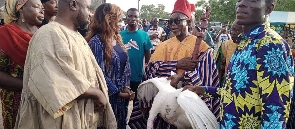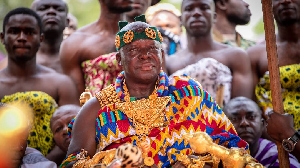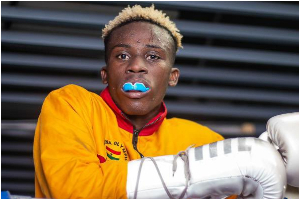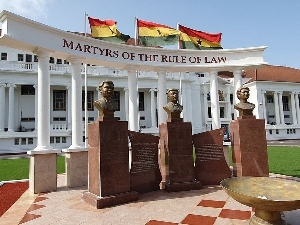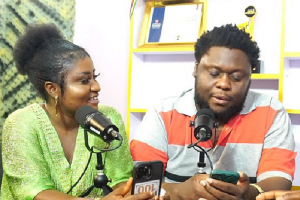Opinions of Thursday, 1 June 2023
Columnist: Jocob Ahiah
Deng Festival of the Vagla, Safalba, Choruba and Nomee people of the Savannah Region, Northern Ghana in West Africa
Historically, the Vagla, Safalba, Choruba and Nomee/Batigee Tribes (People) used to have their annual festival in a community known as Dagbiigu. It was the centre of these ethnic groups. The reason for their annual meetings in Dagbiigu (Dagbigu) was the result of the powerful god in Dagbigu.
It is believed that the Dagbigu god (Kaafo) was the most powerful shrine/deity in the area. So, the Vagla, Safalba, Choruba and Nomee/Batigee people met annually at the Dagbigu community to worship or make sacrifices to the Dagbigu Kaafo (Earth Shrine) to seek blessings and a better harvest.
And after harvest, all these people or tribes converge at Dagbigu to give thanks to their powerful god/deity for a bumper harvest and protection against calamities, enemies, intruders and snake bites. Once the farming season ends, usually in the dry season after the harvest of farm produce, they all assemble or gather at Dagibgu to celebrate the Dagbigu Kaafo for the good harvest and the protection against calamities in their respective communities.
The customary practice of meeting annually in Dagbigu lasted for many years, over a century, from the literature and narrative of the Theocratic State of Dagbigu.
These people experienced a drought that lasted for a long period. The period was too difficult for the Vagla, the Safalba, the Choruba and the Nomee/Batigee Tribes (People). They tried severally with the hope that the Dagbigu Kaafo could change the situation so that it would rain for farming.
All efforts proved futile. It was in one of the meetings in Dagbigu when Mandari Koro suggested to the colleague Chiefs that there was a need to visit a group in a newly established community near Teehbol.
The Mandari Koro, who was also called Mandari Yiri Naa, indicated that he had visited Sonyo and took a traditional oath or vowed to bring dance (Dern/Deng) and make some sacrifices to the god/deity over drought and abductions of people across Black Volta. This, the Mandari Koro/Mandari Yiri Naa went to Sonyo to consult the deity (Earth Shrine) known as the Sonyo Kipo or Sonyo Kupo (in Choruba).
The Mandari Koro took the sacred water, bathed and drank, then took the vow to come back to redeem the pledge (vow) to make some sacrifices to the new god or deity. The traditional leader from Mandari returned home and noticed that the signs of rain were very clear, and all other promises were delivered or fulfilled. The drought situation changed to raining situation, and many other blessings, like the end of abductions, were fulfilled.
This made the Mandari Koro/Yiri Naa call for a meeting of all the Vagla, Safalba, Choruba and Nomee/Batigee Chiefs and people in Dagbigu. It was at such a meeting that the Mandari Koro informed his colleague Chiefs (Koros) that he took an oath to make sacrifices and to send a dance to the Sonyo shrine or god/deity if the deity is able to end drought situations and abductions.
It was at such meeting in Dagbigu that the Mandari Koro informed the other Traditional Chiefs and Elders that there was the need for all of them to move to Sonyo, where he went and bathed and drunk the sacred water ('Sor-Nyor', in Vagli which literally means bath and drink. The bath and drink became the name of the community (Sor- nyor).
The name of the community implies you come there to bathe and drink the sacred water for wonders to happen in personal life transformation or for community wellness. This was how the name of the community near Teehbol became very known and popular among all the indigenous tribes-Vagla, Safalba, Choruba, and Nomee/Batigee.
Hence the popularity of Sonyo and the newly found powerful idol/god/shrine with the name Kipo. The greatest god/shrine is called Sonyo Kipo. This marked a shift from the Theocratic State of Dagbigu to the Theocratic State of Sonyo.
The Mandari Koro has to lead his colleague Koros to Sonyo with a dance and sacrifices to Sonyo Kipo. This became the new annual gathering place for the Vagla, the Safalba, the Choruba, and Nomee/Batigee Chiefs (Koros) and people. Two important events marked these tribes going to Sonyo, namely to Dance ('Deng' in Safalba language) and Sacrifices.
This is the reason why the Mandari Koro often lead the other traditional Chiefs (Koros) and elders to the Shrine (Sonyo Kipo). Since the Mandari Koro took the vow, it was appropriate for him to lead the Koros to the Sonyo Kipo Shrine/god/idol. Such an order remained so till the date (the 21st) Century. Deng Festival has since been practised by the Vagla, Safalba, Choruba, and Nomee/Batigee Chiefs and people for several centuries to date.
Deng Festival is a great annual feast of Dance (Deng) and Sacrifice among the Vagla, Safalba, Choruba, and Nomee/Batigee tribes/people. Deng Festival has several relevance or importance for these indigenous tribes of the Savannah Region of Ghana. Some significance of the festival:
One, Deng Festival marked an annual thanksgiving to the powerful deity/idol/shrine (Kipo) at Sonyo.
Also, it is a period of merry-making among the indigenous tribes of the Vagla, Safalba, Choruba, and Nomee/Batigee. These people go to Sonyo with their various dances to dance. The dancing signifies their joy to the powerful god for redeeming them from drought and abductions.
Also, the Deng Festival marked a period when some people who were barren or impotent came and received their blessings of childbirth. Then the couple/people come back to thank Sonyo Kipo (god/idol). This is one reason why many people from different parts of Ghana and beyond come to Sonyo to celebrate the Deng Festival annually. The festival often comes, usually in May every year. But, the traditional (Lunar) calendar is not in line with the Gregorian calendar.
Moreover, the Deng Festival is relevant as it marked a period of cleansing. The Sonyo Kipo is too powerful to cleanse people of evil spirits or cleanse people from witchcraft, whether acquired or possessed or transferred. The Sonyo Kipo is able to neutralize the powers of Witches and Wizards and set them free from their evil acts of killing, harming or doing all sorts of evil things in society-the people in the Vagla, Safalba, Choruba, and Nomee/Batigee communities.
Thus, witches and wizards are often carried or taken to the Sonyo Earth Shrine for cleansing at any time of the year. After such rituals, the witches and the wizards return to their communities as 'repented persons' or cleansed persons who can no longer do evil or harm community members through witchcraft. This is good news for Vagla, Safalba, Choruba, and Nomee/Batigee people or tribes. The social implication is that there are no witches' camps in their communities due to Sonyo Kipo power.
The Deng Festival is noted as a festival of Sacrifices among the Vagla, Safalba, Choruba, and Nomee/Batigee tribes/people. All their traditional chiefs and elders come to Sonyo every year with animals of different kinds to make sacrifices for many fortunes, like rain and childbirth. It is important to note that the Deng Festival is the brainchild of the Vagla, Safalba, and Choruba people/tribes. Other tribes who later settled in the Vagla, Safalba, Choruba, and Nomee/Batigee communities may also join in celebrating the Deng Festival annually at Sonyo.
The Ngbanya tribe who entered into the Vagla, Safalba, Choruba, and Nomee/Batigee communities from Mande Mali largely around the 17th Century thereof do join these indigenous tribes or people.
Also, other strangers who migrated to Vagla, Safalba, Choruba, and Nomee/Batigee communities in the 19th Century from Southern Ghana, who are all living with Vagla, Safalba, Choruba, and Nomee/Batigee tribes join in celebrating Deng Festival in Sonyo. In the 20th Century, the last tribal groups (LoBrifor) who migrated from Ivory Coast to Vagla, Safalba, Choruba, and Nomee/Batigee area also did join in celebrating the Deng Festival with the indigenous tribes who are the Gonja tribes.
Deng Festival is celebrated by other tribes and people outside the Vagla, Safalba, Choruba, and Nomee/Batigee areas and communities. Thus, Deng Festival now attracts all people across Northern Ghana and different people from Southern Ghana and Ghana's neighbouring countries to join the indigenous tribes to celebrate their traditional Deng Festival in Sonyo.
In conclusion, the Samory War (1895-97) could not enter Sonyo. But the colonialists' policies declined the Theocratic State of Sonyo but did not end the Deng Festival Celebrations. The Deng Festival remains so active, and it is indeed the pride of the indigenous tribes of the Savannah Region of Ghana, West Africa.
Sources
Archival records:
1876. Reports of his Journey into the Interior of the Gold Coast. London: CO.96jII9, 5162 no. 2(3).
1899. Report of the Northern Territories of Gold Coast. London: Office.
1902. Commencement of the Northern Territories, Gold Coast. Colonial Secretary and by district and regional commissioners Speeches (ADM15611144 and 45) Accra/Tamale: Ghana National Archives (ADM15611/46).
1908. The Native Customs Ordinance. This made the 'worshipping of other gods' punishable.
1911. Vagella People
1914. Colonial Annual Report for the Northern Territories. 31 December, 1914. ADM. 56/1/424; Accra. (Grunshi Tribes/Groups placement and matters arising in Mamprusi and Gonja)
1915. Letter to Acting D.C., Bole, to Commissioner, Southern Province 12/04/15. ADM.56/1/70.
1932. Rattray, R. S., Tribes of Ashanti Hinterland. Vols. 1&2 (London: 1932) - on Gur, Tindana
1968. The Vagla Chiefs Epistle to the Colonial Administration.
1968. Levtzion, on the work of the Powerful Deity of Sonyo but spelt Senyon, on page 65.
Vagla History, Customs and Practices:
1987. Vagla Falaa Wia (Vagla History)
1997. EthnoDoxology of Vagla. Music and Dance in Worship.
Vagla Academic Work:
Plange, N-K (1984). The Colonial State in Northern Ghana: The Political Economy of Pacification. Review of African Political Economy, No. 31, Capital vs. Labour in West Africa, 29-43.
Author: J K Ahiah has a special interest in Vagla History, Practices and Chiefdoms-Chieftaincy

